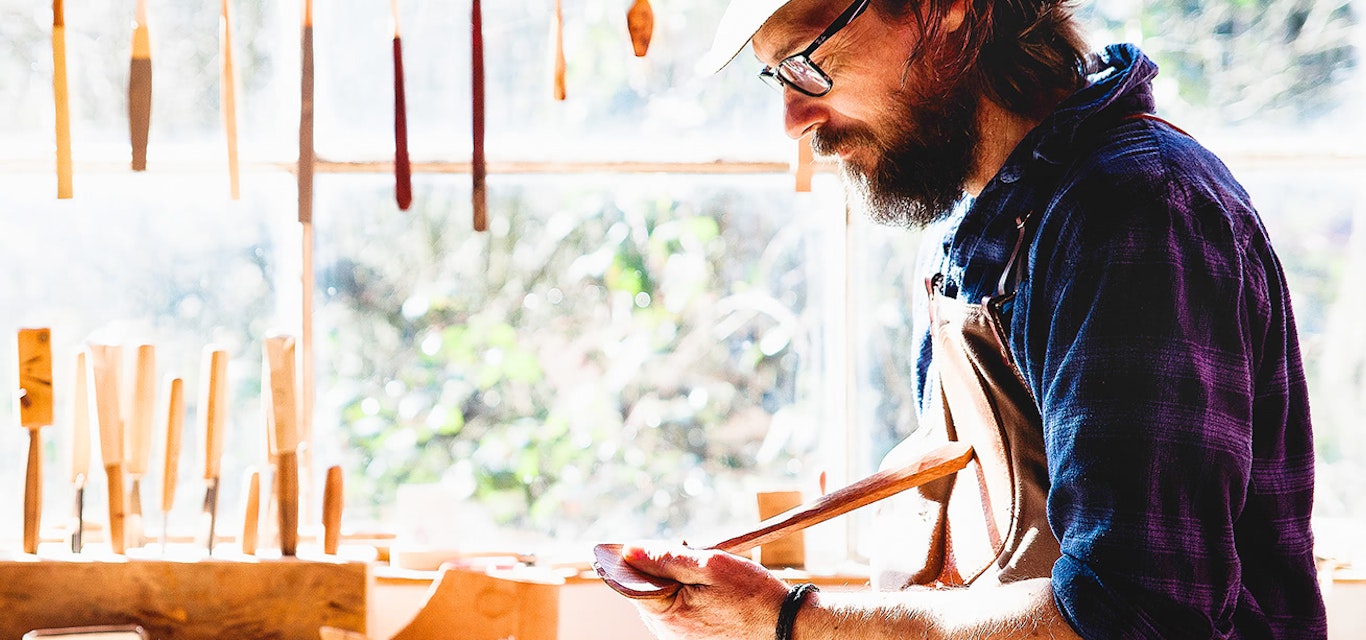A mile in the shoes of a spoon carver
The smell of fresh wood shavings announces that David Rauenbusch is in the office. More precisely, he is in his tree-fringed studio in the southern Tasmanian hamlet of Cygnet, on the banks of the Huon River.
The studio – look for the Phoenix Creations sign – is right next door to David’s home, which he shares with his wife Michelle and three children, but that’s not the only reason you’ll often find him hard at work.
“I try to carve every day – it’s addictive,” he laughs. Even on chilly winter mornings he gets going early, and rarely lights the studio’s wood fire. “It’s quite a physical job; when you are carving with your carving axe, it gets the blood moving.”
Spoon carving is David’s third career. It was during his first job, as a building inspector, that he took up furniture making as a hobby. That blossomed into a career when the family moved from Sydney to Tasmania in 2003. With a stall at Hobart’s Salamanca Market, David relished giving old timber a new lease of life.
“One old lady brought in a leadlight door made of Huon pine. She said, ‘This is from the house I was born in; I’ve been carrying it around for 30 years. Can you make it into something useful?’ I made her a cabinet.”
The shift to spoon making was precipitated by an argument with his wife. “I snapped at him, ‘I’m married to a carpenter and I haven’t even got a wooden spoon in the house!’” Michelle remembers.
“Four hours later, he gave me a Huon pine spoon with a love heart carved in the end [that he’d made].” Michelle immediately realised that spoons were a potential best-seller, an easy-to-pack souvenir for visitors. “I said to him, ‘Do you think you could make more of these?’”
The spoons displayed in the studio are works of art as well as functional implements, each with its own character. Although his first spoons were made using timber offcuts, David now sources timber just for the spoons, mostly through word of mouth.
“I always like to have a few logs lying around,” he says, before Michelle adds, “the two bottom drawers of our new freezer are filled with wood.”
“The vintage timbers are really beautiful, sometimes I’ll come across something like an old Huon pine windowsill. I love it when the timber comes with a story.”
David Rauenbusch
Each spoon takes an hour or two to make, a process that starts with David trimming the wood block to the right size using a carving axe.
“I draw the spoon and use the axe to remove the bits outside the line. Once I have the rough spoon shape, I use a draw knife to refine the shape, and then a smaller carving knife for the precision bits,” David explains. He uses special tools to hollow out the concave side of the spoon.
For those with a do-it-yourself bent, he also offers popular spoon-carving lessons. Don’t expect to match David’s speed, but he promises that “everyone goes home with a spoon they’ve made”.
Find Phoenix Creations at 31 Golden Valley Road, Cygnet, Tasmania.
